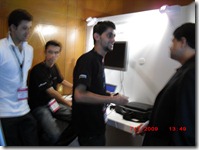Interoperability Award Winners at Imagine Cup 2009
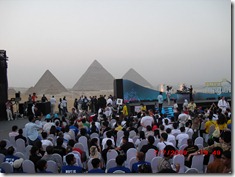 Last week under gaze of the Great Pyramids on the Giza Plateau, the only remaining monument of the Seven Wonders of the Ancient World, I was fortunate to participate in the final ceremony of the Imagine Cup 2009 competition, called the World Festival and the announcement of our Interoperability Award winners. Before I go there I wanted to provide a brief recap of the proceedings of the event.
Last week under gaze of the Great Pyramids on the Giza Plateau, the only remaining monument of the Seven Wonders of the Ancient World, I was fortunate to participate in the final ceremony of the Imagine Cup 2009 competition, called the World Festival and the announcement of our Interoperability Award winners. Before I go there I wanted to provide a brief recap of the proceedings of the event.
After a long trip for many of the competitors, judges and the Microsoft staff. My role was captain and finals judge for the Interoperability award and that 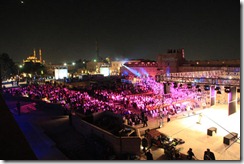 started with a briefing for all participants, the judges and the competitors plus the ability to tour the competition rooms. After the housekeeping was done with, we all filed for a tour and our opening ceremony at the Citadel in Cairo, a major landmark there housing a beautiful and grand Mosque, a fort and museums. We had a great ceremony in the courtyard with a cool breeze that cut the heat and a beautiful sunset.
started with a briefing for all participants, the judges and the competitors plus the ability to tour the competition rooms. After the housekeeping was done with, we all filed for a tour and our opening ceremony at the Citadel in Cairo, a major landmark there housing a beautiful and grand Mosque, a fort and museums. We had a great ceremony in the courtyard with a cool breeze that cut the heat and a beautiful sunset.
We then started the proceedings with a bunch of keynotes and the highlight of the evening was definitely the presentation from Ray Ozzie, our chief software architect at Microsoft who pepped up the students 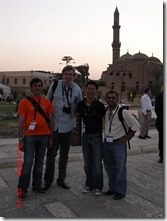 about how they can shape the future through technology, innovation, and creativity with his own personal anecdotes of starting in the world of software. Joe Wilson, senior director of Academic Initiatives at Microsoft, then inspired and gave some advice to our students on the competition, and with all our keynoters joining him onstage started the competition off with a grand laser light display that made our historical venue show off grandly.
about how they can shape the future through technology, innovation, and creativity with his own personal anecdotes of starting in the world of software. Joe Wilson, senior director of Academic Initiatives at Microsoft, then inspired and gave some advice to our students on the competition, and with all our keynoters joining him onstage started the competition off with a grand laser light display that made our historical venue show off grandly.
I had a spectacular set of judges for our award, the judges pictured here with me, from left Tiago Cardoso from Institute for the Development of New Technologies (UniNova) in Portugal, Rob Miles from University of Hull in the UK and Dennis Anderson from Pace University in New York. They all have great credentials, had an eye for interoperability and were very fair in scoring our teams. We all seemed to be very in sync on how we gave out points. They’re also a fun bunch of guys :) The criteria we used and the points percentages was 10% for Architectural Design, 20% for Innovation, 30% for Interoperability, 20% for Coolness and 20% for Presentation.
The final awards were presented at the World Festival by Jon Perera, General Manager for Education Strategy and Audience Marketing, All of these teams have spent numerous hours perfecting their solutions and highlight a disparate set of technologies and multiple platforms to showcase Interoperability.
Third Place, winning US$3,000, went to Team ECRAM from Jordan , with their Elder & Children Remote Mobile Application. Their application allowed for a mobile phone to be remotely control by another client, typically another mobile, especially in the use of elder or child care. It was particularly interesting that it came from a real world problem that one of the team members was facing with his grandmother who wanted to place calls and speak to family members but had difficulties using the phone and required the help of her grandchildren. Being a busy student he was not always available and so thought of solving the problem using technology and software. The system utilized multiple different systems including mobile carriers and web services to solve the problem. Here’s a picture of the team speaking to S. Somasegar, senior vice president of Developer Division at Microsoft
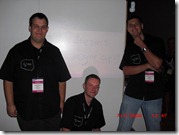 Our Second Place, winning US$4,000 went to Team FteamS from Poland , with their Universal Solution for Remote Education, Eduko. These guys were innovative and cool in the use of disparate technologies on multiple platforms and devices to create a system that enabled teachers and students to interact using a virtual whiteboard system that was enabled on the desktop and even projected on any surface. What was particularly interesting was the use of a WII controller as a camera for their custom IR marker. It served as a very captivating presentation tool. The team also were very smart in the use of mobile devices sending things like text and coursework via SMS and MMS. Very little payload for a lot of information, did you know a single MMS message can send 15 pages of documentation? The guys also put together a very well rehearsed presentation with every team member participating and that impressed our judges too.
Our Second Place, winning US$4,000 went to Team FteamS from Poland , with their Universal Solution for Remote Education, Eduko. These guys were innovative and cool in the use of disparate technologies on multiple platforms and devices to create a system that enabled teachers and students to interact using a virtual whiteboard system that was enabled on the desktop and even projected on any surface. What was particularly interesting was the use of a WII controller as a camera for their custom IR marker. It served as a very captivating presentation tool. The team also were very smart in the use of mobile devices sending things like text and coursework via SMS and MMS. Very little payload for a lot of information, did you know a single MMS message can send 15 pages of documentation? The guys also put together a very well rehearsed presentation with every team member participating and that impressed our judges too.
Our First Place winner, winning the US$8,000 went to Team Proativa from Brazil , with their Virtualized and Social Education system ProLearning which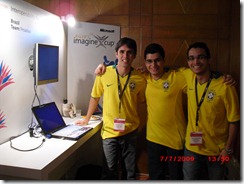 is designed to maximize the experience of distance learning. The use of an immersive virtual reality environment, where students exchange experience and study together the interaction between tutor and pupils dynamic and communal. they utilized social networks to keep students interested in the learning process and engaged continually not just during a lesson. It was a holistic system that facilitated the learning process end to end and that impressed the judges who were all teachers themselves and whom felt they could use it today in their classes. The students had also the capability of using mobile devices to personal and automatically update students on schedules and prompting their network for activities when doing distance learning. It was also novel that they integrated the social networks, mobile devices and voice over IP to get students who were friends or classmates to engage with each other for lessons making the learning experience a team based activity. The main reason that the team won this award however was that they had built a piece of software on the server that brokered different services that didn’t necessarily plug in with each other serving as a technical bridge of sorts. This proved to be the differentiator that help them cinch the award. They had a rousing fanfare by their Brazilian teammates at the finals by being the first prize recipients of the night and helping their country grab the most awards at the competition this year.
is designed to maximize the experience of distance learning. The use of an immersive virtual reality environment, where students exchange experience and study together the interaction between tutor and pupils dynamic and communal. they utilized social networks to keep students interested in the learning process and engaged continually not just during a lesson. It was a holistic system that facilitated the learning process end to end and that impressed the judges who were all teachers themselves and whom felt they could use it today in their classes. The students had also the capability of using mobile devices to personal and automatically update students on schedules and prompting their network for activities when doing distance learning. It was also novel that they integrated the social networks, mobile devices and voice over IP to get students who were friends or classmates to engage with each other for lessons making the learning experience a team based activity. The main reason that the team won this award however was that they had built a piece of software on the server that brokered different services that didn’t necessarily plug in with each other serving as a technical bridge of sorts. This proved to be the differentiator that help them cinch the award. They had a rousing fanfare by their Brazilian teammates at the finals by being the first prize recipients of the night and helping their country grab the most awards at the competition this year.
Here are the teams videos entries:
First place Proativa Team from Brazil
Second place FteamS from Poland
Third place: ECRAM from Jordan
I would like to thank all the competitors who participated in the awards, their mentors, Academic Developer Evangelists, family and friends. Congratulations to our final three winners on behalf of the judges, the Interoperability Strategy team and all of us at Microsoft. I know a lot of work and sweat went into your entries and I want to share how much we all appreciate your contributions! I hope that you all will join me again next year for the Interoperability Award at Imagine Cup 2010. See you in Poland!
Resources
- Interoperability on Channel 9
- Imagine Cup Microsoft Press Pass Page
- Imagine Cup 2009 home page
- Imagine Cup Blog
- Imagine Cup on Channel 9
- Imagine Cup Twitter stream
- Imagine Cup Facebook page
Jas Sandhu
Senior Technical Evangelist, Interoperability Strategy Team
Twitter@jassand, FriendFeed@jassand
